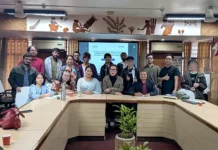Guwahati, 7 May: Assam Health Minister Keshab Mahanta on Sunday said that the state government has initiated steps for cadaveric transplantation, with priority being given to kidneys.
Many legal issues have to be taken into consideration for that, the minister said at an eye donation programme here.
More than 200 people pledged their eyes, which is perhaps the largest group of people in the state doing so at a single event.
Assam adopted the Organ Transplant Act, 1994 in 2017 when the present Chief Minister Himanta Biswa Sarma was the health minister and since then eye banks have been set up at the Gauhati Medical College Hospital (GMCH) and Assam Medical College Hospital in Dibrugarh, Mahanta said.
The process of organ and tissue transplant has started at the GMCH, and “we are progressing in a planned manner with priority being given to kidney transplants”, he said.
Mahanta said that he was overwhelmed to note that such a huge number of people had come forward to pledge their eyes and this shows that science has removed many of the superstitious beliefs associated with death.
Pledging one’s eyes was a great humanitarian act and ‘those who have pledged to donate their eyes today must create more awareness about this and motivate more people to follow their path’, the health minister who also pledged his eyes on the occasion, said.
The programme was organised under the aegis of the Suprabhat Kalakshetra Trust in collaboration with the Sankardeva Nethralaya, Guwahati and Srimanta Sankardeva Kalakshetra Society.
Sankardeva Nethralaya’s President Harsha Bhattacharjee said that there is a general misconception that the entire eye will be removed when it is only the cornea that is transplanted.
‘Human cornea donors are very few and we urge people to come forward to donate so that the problem of corneal blindness can be resolved to some extent’, he said.
Assam is lagging in organ transplantation and he urged the minister to take initiatives to set up organ and tissue banks in all government hospitals of the state, Bhattacharjee said.
Besides, even when donors come forward, there is difficulty in harvesting the organ and keeping it correctly but if organ banks exist, they can systematically deal with the various processes involved, he said.
‘Pledging the eye or any other organ is also not enough as after death the next of kin becomes the owner of the body and if they do not give consent, the organs cannot be collected. Persons pledging their organs must discuss it with their kin,” he said.
Bhattacharjee pointed out that not more than 10 per cent of the eyes pledged are practically utilised though now there are counsellors who try their best to motivate the family members to carry out the wishes of the dead person.
Chief Convenor of Suprabhat Kalakshetra Pradip Pujari said that this single largest eye donation programme was just the beginning and they hoped to create a movement whereby many more will come forward to pledge not only their eyes but also other organs for transplantation as well as scientific research. (PTI)

